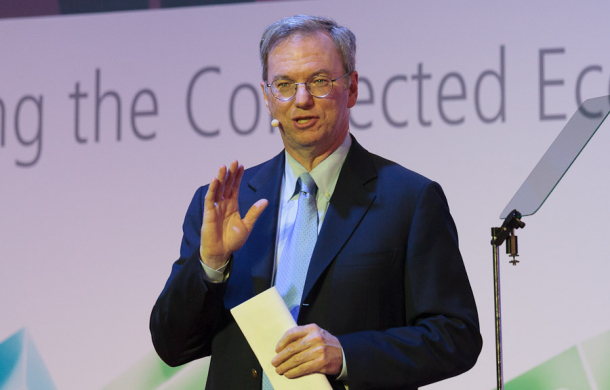Schmidt: UN treaty a 'disaster' for the internet

Internet freedom and innovation are at risk of being stifled by a new United Nations treaty that aims to bring in more regulation, Google's executive chairman Eric Schmidt has warned.

At Mobile World Congress, Google's Eric Schmidt has warned against a new UN treaty that could bring in more internet regulation. Image credit: Stephen Shankland/CNET News
In a question-and-answer session at Mobile World Congress 2012 on Tuesday, Schmidt said handing over control of things such as naming and DNS to the UN's International Telecommunications Union (ITU) would divide the internet, allowing it to be further broken into pieces regulated in different ways.
"That would be a disaster... To some, the openness and interoperability is one of the greatest achievements of mankind in our lifetime. Do not give that up easily. You will regret it. You will hate it, because all of a sudden all that freedom, all that flexibility, you'll find it shipped away for one good reason after another," Schmidt said.
"I cannot be more emphatic. Be very, very careful about moves which seem logical, but have the effect of balkanising the internet," he added, urging everyone to strongly resist the moves.
International governance of the internet
The ITU, which is part of the United Nations, this week began discussing changes to a 1988 treaty that would bring in international governance of the internet. At the moment, web businesses, technology providers, user groups, engineering groups and others collaborate without such oversight to keep the internet running.
The new proposals, thought to be backed by Russia and China, would extend regulation into areas such as cybersecurity and give the ITU dominance over such "ground up" organisations as ICANN, according to US Federal Communications Commissioner Robert McDowell. The proposals will go to a vote by the 193 members of the ITU at a meeting in Dubai in November, after which they could become part of international law.
"There's a lot of concern among the internet community about the transfer of control of the internet to the ITU," Schmidt said at MWC in Barcelona. "The ITU is a magnificent organisation and has done a great job in telecommunications... but the principles of the way that the web has worked are different."
"If the current governance is working pretty well — and I think it is — I wouldn't move it [control of the internet] or if I did I would do it very, very carefully," he added.
Role of regulators
Schmidt acknowledged regulators have a role to play. However, he advised decision makers to consider the future when settling on how to govern the internet over things such as privacy.
"There's a tendency of regulators to regulate what is happening now as opposed to what will be," he said. "If you have to regulate, try to do it for an outcome, not the technology. If there is an outcome you don't like, don't specify in law a specific type of solution, because the technology moves forward."
In addition, regulators should explain more fully the true outcomes of their decisions, he urged.
"The unintended cost of regulation is often the loss of innovation," Schmidt said. "There's a winner and a loser in these regulatory battles... You have to be very careful to frame that correctly, so people understand what they are losing as well as what they are gaining."
Get the latest technology news and analysis, blogs and reviews delivered directly to your inbox with ZDNet UK's newsletters.